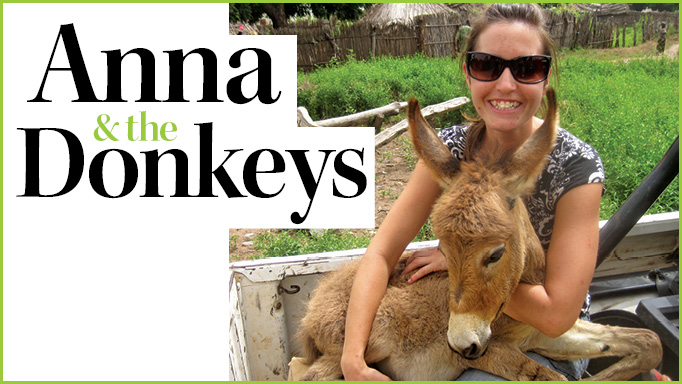Anna Saillet of the UK spent five years in Gambia as a volunteer with the Gambia Horse and Donkey Trust. In a time filled with adventures, joys, and heartaches, she talks about improving the lives of working horses and donkeys.
Can you think on your feet, stand on your head, and rub your belly all at the same time? I think that’s what it should have said on the advert to volunteer for the Gambia Horse and Donkey Trust!
With 14 trained Gambian staff working at GHDT, the yard is always bustling and each day has its own challenges. There are several regular programs including the school education program, which involves travelling around to ten local schools to teach Grades 5, 6, and 7 about how to care for horses and donkeys correctly. Conscious of not wanting our classes to be ‘just another boring lesson,’ we often find ourselves dressed as donkeys, crawling around a classroom floor, or doing puppet shows with toy horses and donkeys. We also have to clear up donkey droppings from classroom floors when our real-life demonstration animals decide to deposit an entertaining present for a class of giggling children.
Our particular lesson confirmed that our rather ‘different’ teaching had indeed been a great success. On doing a quiz with each of the classes, I was more than a little overwhelmed to see almost every hand in the class go up to eagerly answer each question. I am by no means a teacher, and to witness such a wonderful display of understanding of lessons brought a tear to my eye.
Treating sick animals on the basis of physical signs only is difficult at the best of times, let alone in the blistering heat! Thankfully, some of our staff are trained in the use of the microscope and are able to examine the blood of horses and donkeys to confirm whether or not an animal has trypanosomiasis, a very common and dangerous disease here. It is also not uncommon to be presented with horses and donkeys with severely fractured legs and being asked to fix them. The things that have been achieved here make me seriously question just how many horses are unnecessarily put to sleep in the UK, as we have living proof at GHDT that horses and donkeys can recover from broken bones, horrendous wounds, horrific burns, and even diseases which cause temporary paralysis.
The general conception here is that Allah will decide whether an animal should live or die, and this means that often an owner will not allow us to humanely kill a sick animal. Instead, we have to do everything we can to save the animal and limit its suffering. This at times can be heart-wrenching, but when I see our stallion, Tallah, galloping around the paddock, totally oblivious to the fact that he ever had a broken leg, it gives me the strength to just keep on trying our best with the little that we have.
With a yard of often sick horses and donkeys, it’s inevitable that from time to time there’s one that needs someone to stay up with it all night, to nurse it through to the daylight hours. Then there are the night feeds for the orphaned horse and donkey foals, lambs or goat kids that happen to fall into our lives. Once in a while you have the odd quiet night during which there are no dramas!
We are very lucky to have vets from the UK to come out four times a year to teach students from Gambia College about equine medicine. Our staff (including myself) have been taught how to do injections, stomach tubing, and stitching, among other important procedures.
Living in this tiny, remote village without electricity and hot water is not for the faint-hearted. Every day is filled with tough decisions to be made, often meaning life-or-death for a sick animal. For some of the very gory scenes I have witnessed, I am thankful to be blessed with a strong stomach.
On a good day, this place gives you a great sense of adventure and achievement. On a bad day, it feels like you’re sinking to the bottom of the river, but these are few and far between … and wouldn’t life be boring without a challenge?
Charity Starts at Home
If you are feeling charitable during the holidays (or anytime), it can be good for the soul to give back. Here is a list of just a few Canadian rescues and charities that help make life better for equines:
- Canadian Horse Defense Coalition
- Bear Valley Rescue
- Circle F Horse Rescue Society
- Dare To Dream Horse Rescue
- Freedom Valley Horse Rescue
- Hayburner Haven Farm
- Heaven Can Wait Equine Rescue
- Horse Rescue Ontario & Sanctuary
- J&M Acres Horse Rescue
- Last Chance Horse Rescue
- LongRun Thoroughbred Retirement Society
- New Stride Thoroughbred Adoption Society
- Paradise Stable Horse Rescue
- P.E.I. Equine Retirement Society
- Performance Standardbreds
- Pipsqueak Paddocks Miniature Horse Haven
- Prince George Equine Rescue
- Refuge RR for Horses
- Rescue 100 Horses
- Rocking Horse Ranch & Rehabilitation
- Ruby’s Voice Equine Rescue
- Saddleridge Equine Sanctuary & Rescue
- The Donkey Sanctuary of Canada
- Whispering Hearts Horse Rescue
- Wild Rose Equine Rescue & Sanctuary
… or your provincial or regional Society for the Prevention of Cruelty to Animals
* Horse Sport does not endorse or guarantee the validity of any of the agencies listed.

